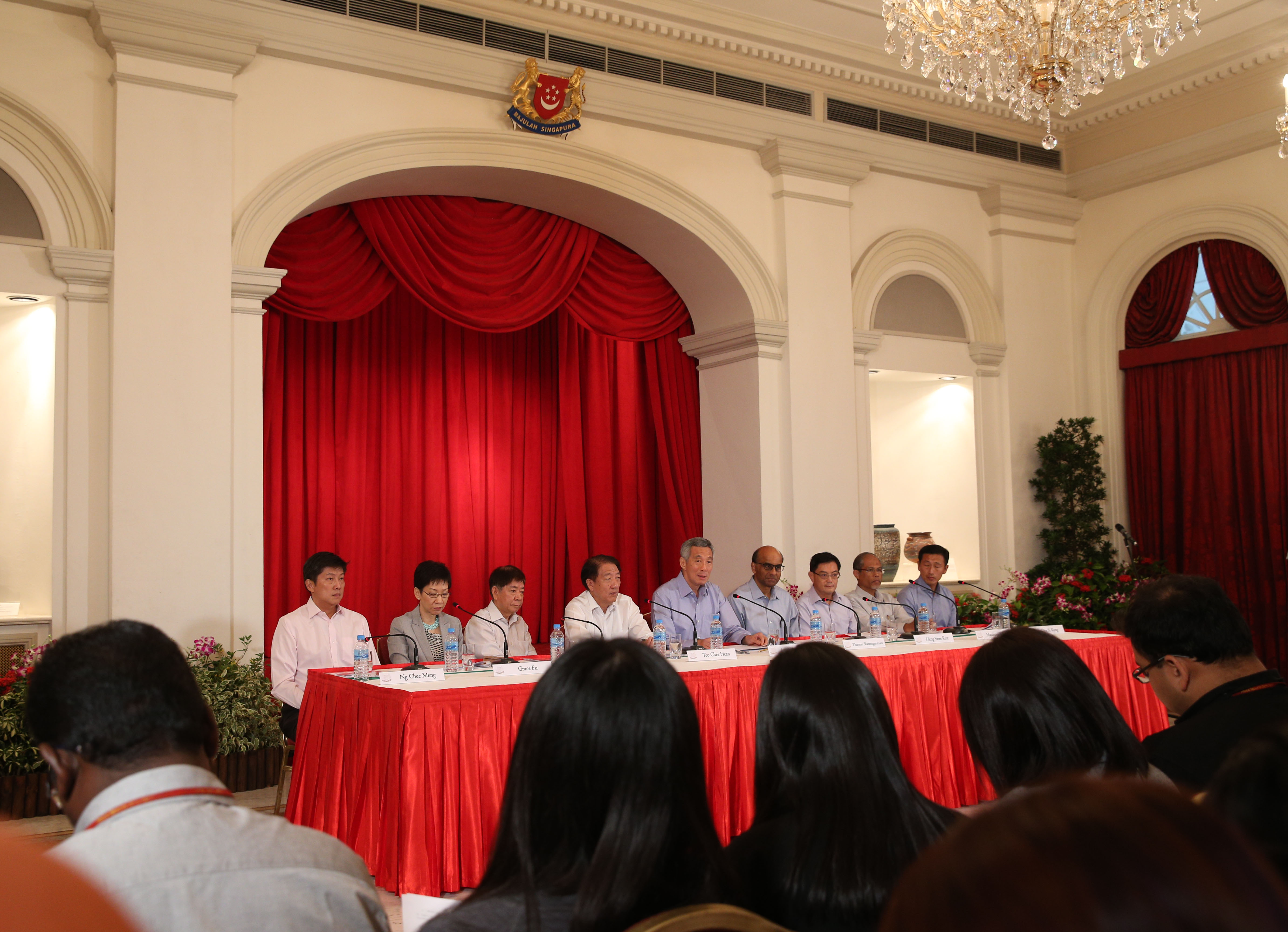Transcript of the Question and Answer Segment at the Press Conference on the new Cabinet Line-Up on 28 September 2015.
Watch the full Q&A playlist.
View Prime Minister Lee Hsien Loong's Statement at the Press Conference.
* * * * *
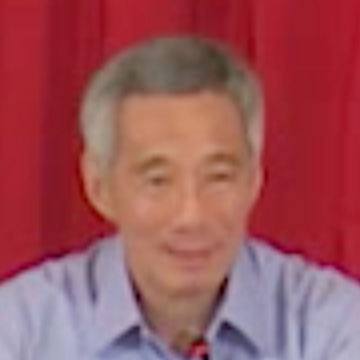
PM Lee Hsien Loong: Thank you. I will be happy to take questions, and so will my Ministers.
Lianhe Zaobao: Sheo Be from Zaobao. Four questions.

PM Lee: How many questions?
ZB: A couple. The first question is, we are only seeing Minister Lui retiring and no other Cabinet Minister this time round. So just wondering whether we can expect, or maybe, we may expect more Ministers to step down mid-term? That’s one question. And also, Prime Minister, how would you describe these changes this time round? Finally, one question in Mandarin: 总理,想问一下,华社这部分,新的议员来讲,会不会还有一些议员会协助 – 我相信是陈振声部长会继续这个协调的工作 – 我想知道新的议员是不是会协助他这方面的工作?

PM Lee: First, Ministers retiring mid-term. So far, as I said, I have three office holders who have stepped down from the previous team – Lui Tuck Yew, Lee Yi Shyan as well as Hawazi. Will there be more changes? I expect more changes, including mid-term. Several Ministers have spoken to me to say they will be happy to go, once we can find suitable successors. But I said that we have to see through this changeover, this transition, and they are fully with me on that. I think we will make further changes during mid-term.
How would I describe these changes? It is a bold move. I am pushing the time table. I have a deadline to meet. I want to have a team ready to take over, soon after the next election. So I want people tested; I want people developed; I want people exposed and known to the public; their confidence built up and the team shaken down. So that within the team, they know who can do what, how they can work together, who can emerge as the leader of the team.
As for the last question, 华社。陈振声部长会继续跟华社打交道、沟通。当然,教育部母语教育,华文方面也非常重要。以前,这个是由沈颖负责的。现在, 沈颖已经调到其他部门了,所以教育部我调进刘燕玲。我相信刘燕玲可以扮演沈颖以前的角色。新的议员有好几位华语都不错。他们上任之后,我们给他们一点时间安定下来,那我们会选择适当的人,帮助我们继续做这个沟通交流的工作。
The question was: who is responsible for liaison and maintaining links with the Chinese community? I said Chun Sing in NTUC continues to do that. MOE is very important for mother tongue language education. Sim Ann is not there anymore, but we have Low Yen Ling, who I think will be able to play a similar role. As for the new MPs who have come in, quite a number of them speak good Mandarin. A few speak even very good dialect, so I expect some of them to be very useful in this role once they have settled down as MPs.
Yes, Zakir?
The Straits Times: PM, two questions. Can you elaborate on the thinking behind setting up three Coordinating Ministers and how do you hope they will better coordinate whole of government efforts? The second question is, would you be able to give your assessment on some of the backbenchers who have been appointed or moved up, like Dr Koh and Janil?

PM Lee: The Coordinating Ministers, the principal considerations I have set out – there are two reasons. One, I think there are more and more issues which are cross-ministries and inter-departmental. If you are talking about population, it is not just a matter of economic incentives; it is also a matter of social policies and housing policies. If you are talking about infrastructure, you need a Ministry of Transport building roads and rail lines; you need MND building houses; you need MOE building schools; you may need MCI building IT infrastructure. It all has to come together; not easy to coordinate, but it all has to come together. I cannot have one ministry for each of these cross-cutting things, and even if I did, they will all have to link up with one another. So that’s one consideration. If I have Coordinating Ministers, they can oversee this and help to bring the pieces together.
The second consideration is with Coordinating Ministers. I am able to move more boldly, putting new Ministers into the specific ministries – in MOE, in MND, in MFA. With a Coordinating Minister overseeing them, I can take the chance on a new person, and let him find his feet and master the job, and we can be sure that it will work out. There are several considerations. It is an arrangement which is not new to us. If we look at other governments, they often have – they call it different names – it could be a Secretary of State in Britain; in Indonesia, they call it Menko, and then you have multiple Ministers working under him. We are going some way in that direction. I have three Coordinating Ministers. I have not designated who reports to which Coordinating Ministers, because it may be multiple reporting. But I think that they will play an important role, pulling the pieces together and mentoring the younger ones.
The backbenchers who are coming in, I have got Baey Yam Keng coming in, who is an experienced backbencher. I think he has got good skills, he has got good outreach skills, especially outreach to young people. He has got network with the arts group, particularly the theatre groups. I think he has got good communications skills on how we can get our message across, how we can present it, how it can be put in the terms of the new media if you need to, or mainstream media if you need to. I think he will make a contribution in MCI.
Janil, you know him, because I think he has made an impact in Parliament. He is a doctor, but he actually knows about a lot of things outside medicine, and therefore I am going to use him in MOE and also in MCI. Sorry, Baey Yam Keng is in MCCY; Janil is in MCI. I think that Janil with his skills will also be able to help Vivian, working on the Smart Nation initiative. I think he will be busy. He has volunteered with the SAF. He has finished his basic training, but there’s more training to come. I expect to see him come to Cabinet in uniform, from time to time.
Channel 8 News: 总理,我是8频道记者淑慧。我想以中文来提问。

PM Lee: 好。
Ch8 News: 首先,可不可以请您以中文来谈一下,这一次内阁的名单,您主要有哪一些考量点?主要是希望可以给国人带来怎样的讯息?第二,请您谈一下交通部长的人选。请问是许文远部长毛遂自荐吗?为什么选许文远部长?然后,中期的检讨,大概是什么时候会落实?

PM Lee: 这次内阁主要有三个考量。第一,是如何应付我们未来的挑战,因为我们已经过了SG50。下一个阶段,我们所面对的挑战不相同。我们的经济已经比较成熟了。我们的社会逐渐老化了。我们的增长没有像以前那么迅速。要如何维持增长,同时在经济和非经济方面取得平衡,这个是我们内阁必须考虑的一个主要问题。所以我们组成的内阁,就必须有对这些方面有兴趣、有经验、有能力的成员。
第二,我们在新的情况下,跨部门的问题比以前多了。不是所有的问题都可以委任某一个部门单枪匹马去解决的。教育问题也牵涉到社会层次。住房问题也关系到我们的基础设施和我们的交通各方面。所以这些方面要协调、要配合,是许多部门必须密切合作才能够做得到。要使这些部门更密切地合作,就必须由我本身或者是由我的同僚去配合,去协调它们。在国家安全方面,我们已经有了统筹部长,是张志贤。其他方面,我们以前没有统筹部长的,可是经济和社会政策方面,尚达曼实际上已经扮演着这个角色。 所以我们现在名正言顺地给他这个名衔负责统筹经济和社会政策。 这个不只是平平稳稳的,依照既定的方向行走,因为我们经济方面要继续提升,要继续转型,还需要做一些决定。 社会方面,我们的社会安全网,逐渐完善了。但是,我们还要逐步改进它,所以这里还有工作要做的。
第三方面是基础设施,基础设施大家知道这个是所有新加坡人都有意见的一个课题。如果基础设施不完美,或者有缺陷的话,大家都会马上就感觉到。所以,我们认为这方面会很重要,需要许文远部长的经验。一方面他已经在国家发展部,另一方面,他现在将转移到交通部,我看他是基础设施统筹部长的理想人选。至于为什么他被派到交通部呢,我看这个是有机会,有工作做,并且有最恰当的人选,所以把他派到交通部,并且他也愿意去。 所以等一下我把麦克风交给他,他肯定有话说。
中期调整内阁,“中期”是什么时候。 我看我每年都会有大大小小的调整。 可是中期我相信是两年或者三年后会做一个比较大的调整。
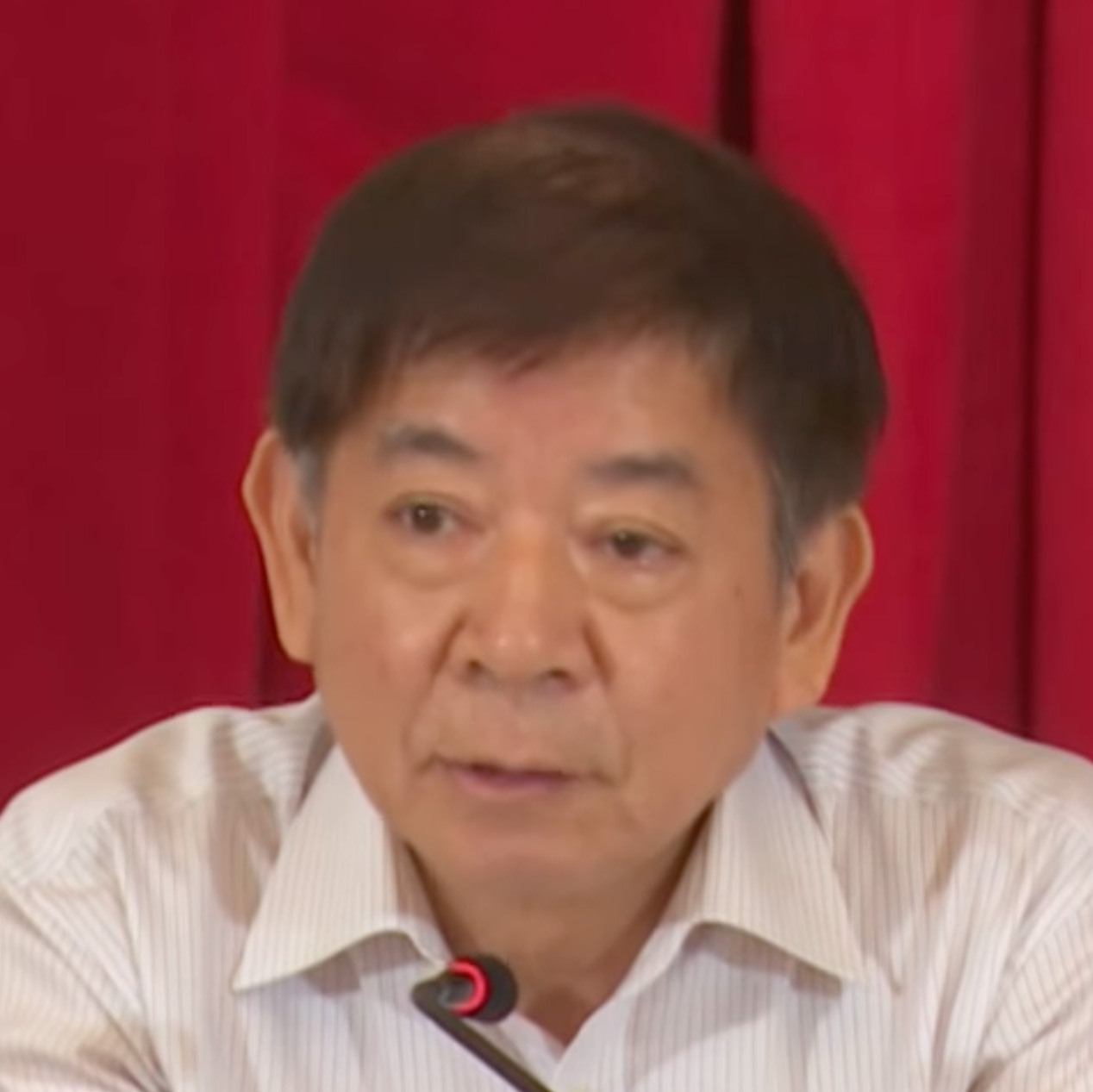
Minister Khaw Boon Wan: 刚才你问的是说,我这一次是不是也再次是毛遂自荐 。毛遂自荐一次够了,第二次肯定会给人家误会的。
Berita Harian: Prime Minister, I am Saini Salleh of Berita Harian. My question will be on the Malay leadership. Now we are seeing Mr Masagos moving into assisting Mr Yaacob. Why is this so? That is my first question. Secondly, can I have your comment on some of the Malay MPs? It appears to us that they are going to hold more responsibilities. What does this mean to our Malay-Muslim community?

PM Lee: You want me to reply in English? Ok, I will do it in Malay. Kali ini saya menjalankan perubahan. Kabinet saya yang besar. Dalam Kabinet baru, kita harap dapat mengatasi masalah-masalah yang akan datang dan pada masa yang sama bakal mempersiapkan kumpulan pemimpin seterusnya, mengambil alih tugas saya dan rakan-rakan pemimpin kanan saya, selepas Pilihan Raya yang akan datang. Yaacob Ibrahim akan kekal sebagai Menteri bagi MCI dan terus bertanggungjawab bagi ehwal masyarakat Islam. Ini adalah jawatan yang penting dan sensitif kerana Teknologi Maklumat iaitu IT membolehkan kita mempertingkatkan ekonomi dan mentransformasikan Singapura. Yaacob akan teruskan usaha untuk bantu kita mengharungi media dan media baru dalam sekitaran yang lebih mencabar. Masagos telah menunjukkan prestasi yang baik bagi kedua-dua jawatannya di MHA dan MFA. Masagos akan menjadi Menteri bagi Sekitaran dan Sumber Air. Air akan terus menjadi sumber strategik untuk kita. Perubahan iklim dan kemampanan (climate change and sustainability) adalah agenda penting di peringkat antarabangsa. Masagos juga akan membantu Yaacob dalam menguruskan Ehwal Masyarakat Islam. Saya juga telah berbincang dengan Menteri Yaacob. Beliau akan melantik Masagos sebagai Timbalan Pengerusi Yayasan Mendaki. Maliki Osman juga telah mencatat prestasi baik bagi jawatan menterinya dan juga dalam kawasan undinya, mendekati para penduduk Siglap dan telah menyumbang kepada kelakonan baik di GRC East Coast pada Pilihan Raya ini. Jadi saya menaikkan pangkat Maliki kepada Menteri Negara Kanan. Di kalangan barisan pemimpin muda pula, saya melantik Amrin Amin sebagai Parliamentary Secretary atau Setiausaha Parlimen di MHA. Amrin adalah pemegang jawatan termuda sekali dalam Kabinet ini, 37 tahun. Beliau memiliki keinginan yang kuat untuk berbakti kepada masyarakat. Saya harap jawatan barunya ini akan menjadi satu permulaan bagi sumbangan yang lebih besar di hari muka. Saya juga ingin mengucapkan penghargaan saya kepada Hawazi Daipi, Setiausaha Parlimen Kanan di MOE dan MOM yang telah meminta untuk bersara sebelum pilihan raya ini. Sumbangannya yang ketara di MOM termasuk membantu memajukan pekerja bergaji rendah dan mempertingkatkan keselamatan di tempat kerja. Di MOE pula beliau memperjuangkan pendidikan Bahasa Melayu terutama Bahasa Baku dan memperkukuhkan kerjasama antara ibu bapa serta masyarakat. Secara peribadi saya juga terhutang budi kepada Cikgu Hawazi kerana setiap tahun beliau membantu saya menyiapkan ucapan Rapat Umum Hari Kebangsaan agar lebih lancar dan relevan kepada masyarakat Melayu/Islam. Jadi Kabinet baru ini memang agak besar kerana ia adalah satu kumpulan peralihan. Saya akan menilai semula di pertengahan tempoh nanti dan membuat perubahan tambahan. Saya mengalu-alukan sokongan berterusan dari masyarakat Melayu/Islam kepada saya dan pasukan saya ini supaya kita dapat terus bekerjasa sama dengan erat demi masa depan Singapura yang lebih cerah.
CNA: Olivia from Channel NewsAsia. PM, you spoke about preparing the next team to take over. You previously had also spoken about finding your future successor. Can we find out is your future successor in this new Cabinet? Also, for the three Coordinating Ministers, would you be able to share with us what your priorities would be going into this portfolio. Thank you.

PM Lee Hsien Loong: I think it is most likely that the future successor is in this Cabinet because there is no time. And, if somebody else has to come from outside this Cabinet, it will mean something has gone wrong very unexpectedly. The Coordinating Ministers are here, and I think they would be happy to say a few words.
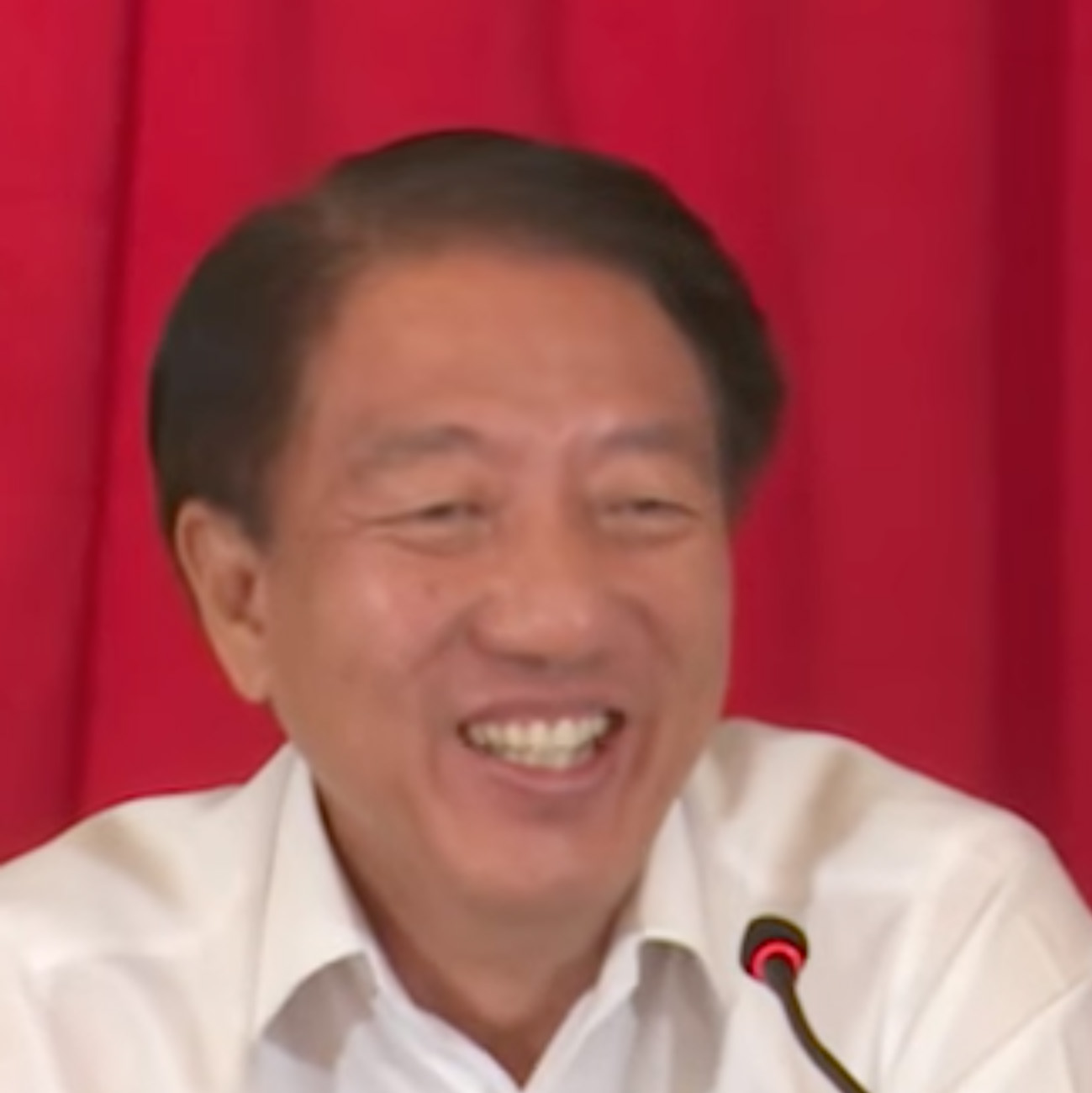
DPM Teo: From the national security point of view, the new challenge of terrorism is one particular area I would like to focus on – new developments because of ISIS and what is happening in our region. Second, I will help Prime Minister shape the agenda of the Strategy Group at the centre of government, help them to support the whole-of-government work and the inter-agency work, and support PM and also other Coordinating Ministers. Third, I would say the major responsibility now is to help PM to develop the new team – to help guide, mentor, share our experiences and to help them to succeed.
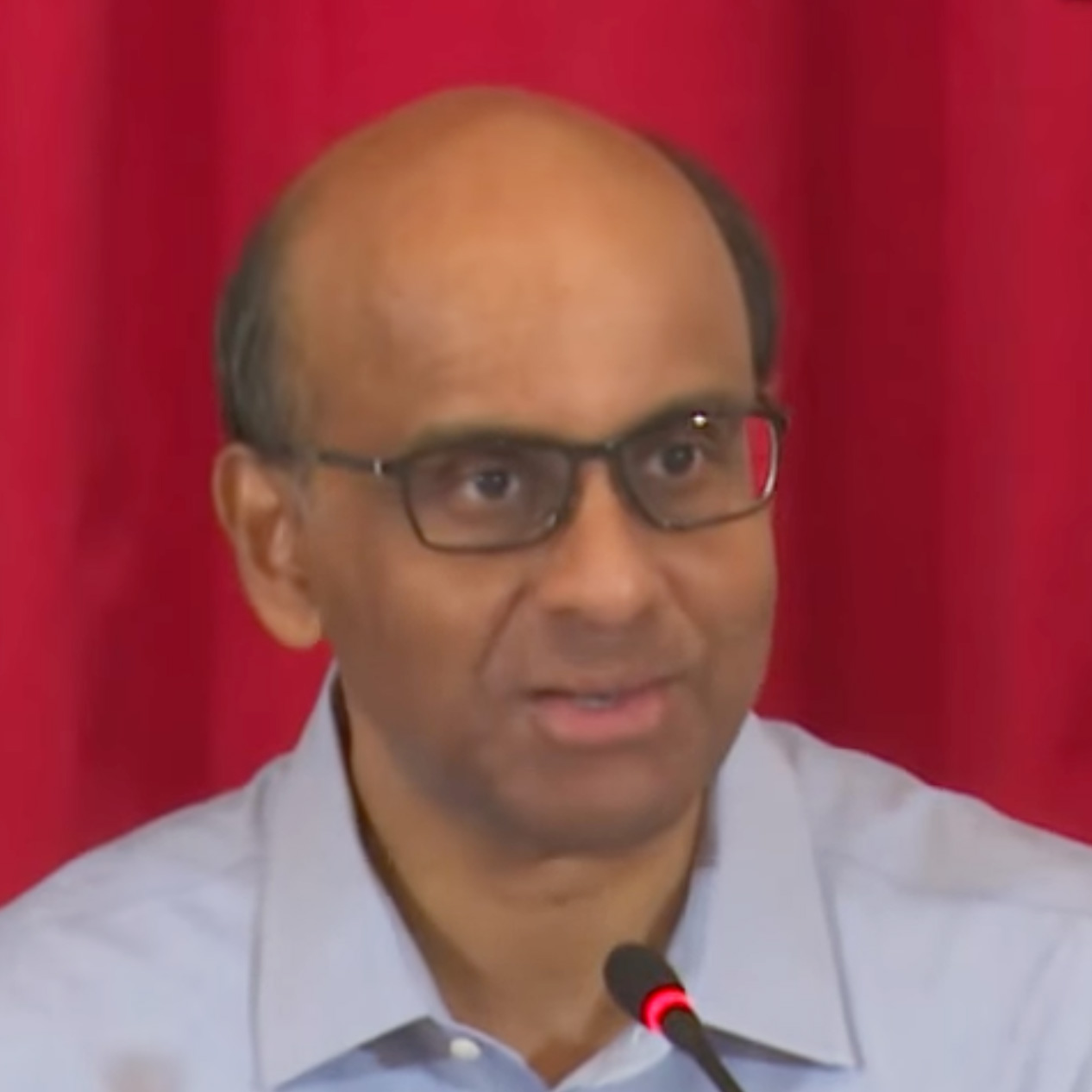
DPM Tharman Shanmugaratnam: So just very briefly, we are not starting from scratch on economic and social policies. We about some years ago picked up pace; in the last few years on a whole set of initiatives – economic restructuring, SkillsFuture, strengthening our safety net. We have to not just continue that work, but it is getting more complex and the choices we have to make are not simple ones. We will have to think very hard about them – what can we afford, how do we provide the right incentives, what shake-out do we accept in the economy, how do we consolidate and strengthen the firms and our future. It is a task that involves close coordination, close consultation. As a Coordinating Minister, I am not going to be peering over the shoulders of the Ministers. But it is continuous consultation, advice, before we actually come to agreement in Cabinet. And like Chee Hean, I would like to play an active role in guiding and supporting the new team. We are never in an ideal situation for succession. But this is as good as it gets, where we have experienced people still in Cabinet, and we have a new team, each of whom are solid people with their own track records both in and out of Government, and in most countries, you are given one or two years to take over, sometimes not even a year. Here, we have got five years, shorter than it has been for the normal practice in Singapore, but I think entirely doable because these are good men and women, and we have got experienced hands still in Cabinet.

PM Lee: Khaw Boon Wan?

Minister Khaw: That we need coordination for infrastructure and development is obvious. We have always had coordination but at the official level. So master planning committee – they are multi-agency in nature. But what is critical now, is to inject this political leadership to make sure that the political considerations are fully factored in too. I will also be the Transport Minister and will have another major objective, which I always feel we can further raise the quality of life for Singaporeans, if we can make Singapore a lot easier for Singaporeans to move about with ease on feet, bicycles, buses, trains and occasionally some driverless cars which you do not have to own it. So that is part of the vision of a future Singapore – a car-lite lifestyle which I think Singapore can aspire to be. We are not there yet. So the question is how to move from here to that destination. So I will be sharing over the next few months and weeks some of my ideas and I welcome suggestions and comments from Singaporeans. One critical piece in this vision is of course, a very extensive and reliable rail infrastructure. We have launched a huge number of rail lines, some 60 billion dollars worth of rail lines. When fully implemented, I think it will be a big plus for Singaporeans and how we move about. But reliability, we are not quite there yet. So the last few weeks, I have been sniffing around and asking around for ideas on who do you think is a good rail operator, the best in class and best in the world?
Everybody points me to Hong Kong. So I checked around in Hong Kong and compared our performance and reliability with Hong Kong. Yes, we still have a gap to close, we had made a lot of improvements in the last two to three years, but the gap remains and we will aggressively push to close the gap. At first, I was hoping that in Hong Kong, I would be able to find that they never had disruptions. Unfortunately, I was very depressed when I read that they also have major disruptions. Last year, they had 12 major disruptions, which means one disruption per month – and that is the best in class. So I think, let us be realistic about this complex system called railways. Although it is not rocket science, it is also not straight forward. So the journey forward; it will not be smooth. There may be some fires big and small; I will have to get Singaporeans’ understanding and patience to do our best.

PM Lee: One or two more questions? Because I think you want to rush to file by five o’clock. Second row, lady. Go ahead. Where are you from?
CNA: My name is Liyana and I am from Channel NewsAsia. You have chosen two new MPs to lead the Education Ministry instead of letting someone more experienced to helm it. Why and what do you see in these two men that give you confidence that they will be able to perform, and they will also be assisted by Dr Janil Puthucheary? Who will be mentoring Mr Ng Chee Meng and Mr Ong Ye Kung? I also have two questions for Mr Ng and Mr Ong – what will be your first priorities taking over MOE and from your background and experiences, what and how can you contribute? And my last question is to Mr Ng Chee Meng. You are also juggling an MOT portfolio as Senior Minister of State for Transport, which we all know is a much talked about issue amongst Singaporeans, and there will be a lot of expectations on you and the Ministry. How ready are you to take on this role and how can you assist Minister Khaw Boon Wan?

PM Lee: I have appointed Ng Chee Meng and Ong Ye Kung to MOE because I have known them before they entered politics. Ong Ye Kung was my Principal Private Secretary and worked in the Singapore Workforce Development Agency, and was in NTUC before he contested in the last election. He did not win the last time, but we kept in touch. Ng Chee Meng has been in the Singapore Armed Forces. He has been the Chief of Defence Force and I have worked with him and know him. I think they have the potential, and need the experience and exposure to do their jobs. I have put them there because this is a substantial job and also I am able to supervise, oversee and mentor them with experienced former Ministers for education – I have three. I have Chee Hean, I have Tharman and Eng Hen. Actually, I have four – and Heng Swee Keat. So there are enough sources for advice, and I know these two people are able to take advice and make up their own minds. What they will need to do, is to establish themselves with the teaching establishments – the teachers, educators, and with parents who need the confidence to know what they are doing, and with the public – to show that they are able to manage a big ministry, and I have confidence that they will do that. Who will be mentoring them, I have already answered that and I think your next two questions are for them.
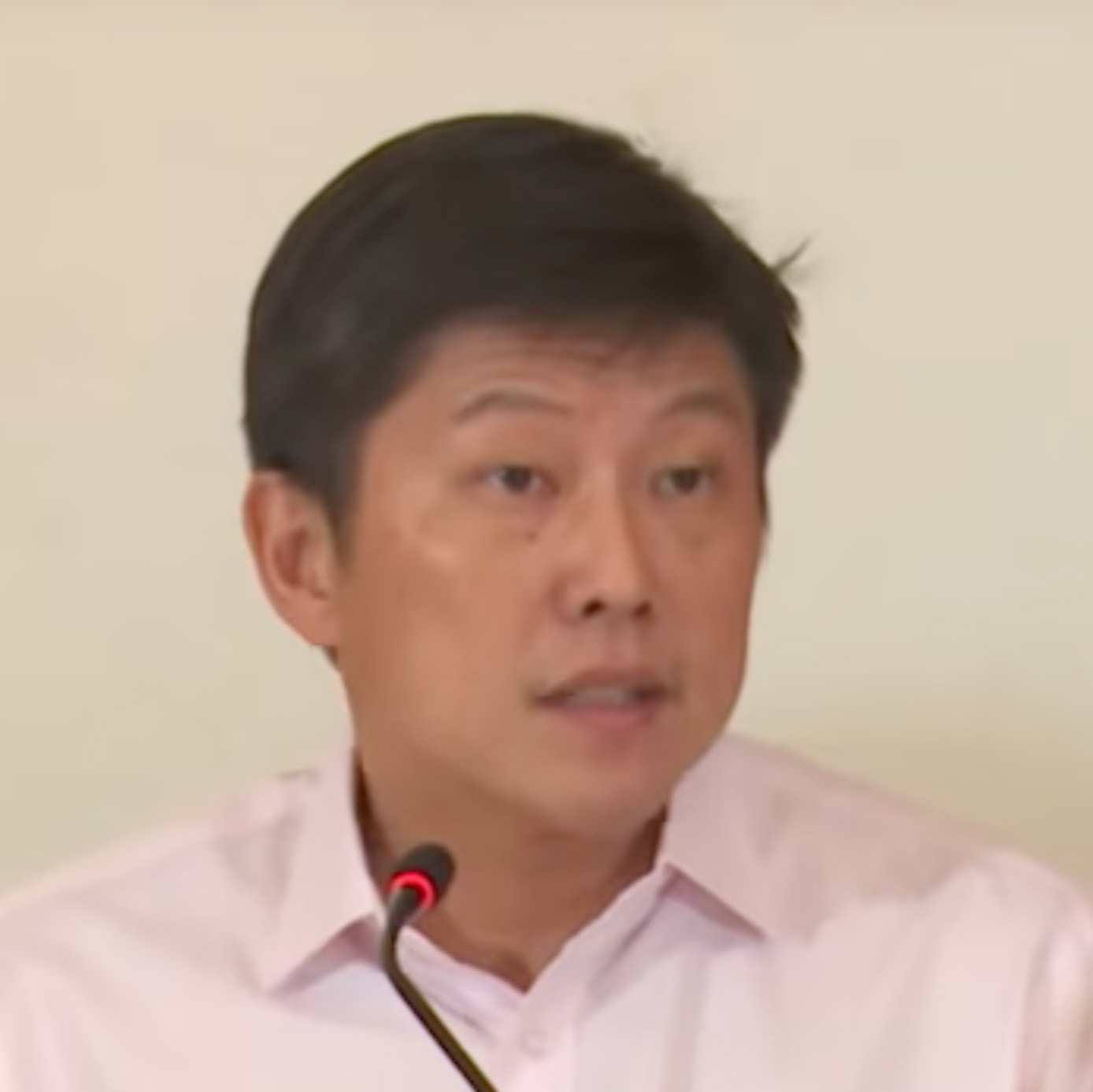
Acting Minister Ng: My immediate priority really is to understand the education issues with Ye Kung and our colleagues at MOE. It will take some time to consult with our committed educators, our parents and also the community at large, basically to learn about these issues. Also to answer your second question on how I can value add, I think it is a little too soon to go into details to those areas. I think Singapore and Singaporeans recognise that education is one of the best gifts we can give to our children, and we have consistently invested in this area. It is also part of our national strategy to give the best to our kids, to ensure that Singapore can succeed in an increasingly complex world. So I take on this heavy responsibility with enthusiasm, hopefully, with the ability to value add. The way I see education is that it is a holistic approach, where we look at a complete person. In Chinese would be the five aspects of 德,智,体,群,美. It is basically the moral values education to anchor the cognitive development, the physical development, the social development and the aesthetics. It will be broadly at this stage, the things I will be looking at, together with our educators, parents and the community at large. For the MOT portfolio, I am very happy to be able to learn from Minister Khaw. He has a rich library of instincts and judgement after helming many challenging Ministries. I will leave it to Minister Khaw to assign me the necessary tasks and I will do my very best to learn about this complex system called transport. Some areas I may have some relevant expertise, in aviation, but will humbly learn from Minister Khaw and see where I can help him do the work at MOT. Thanks.

PM Lee: Ye Kung?
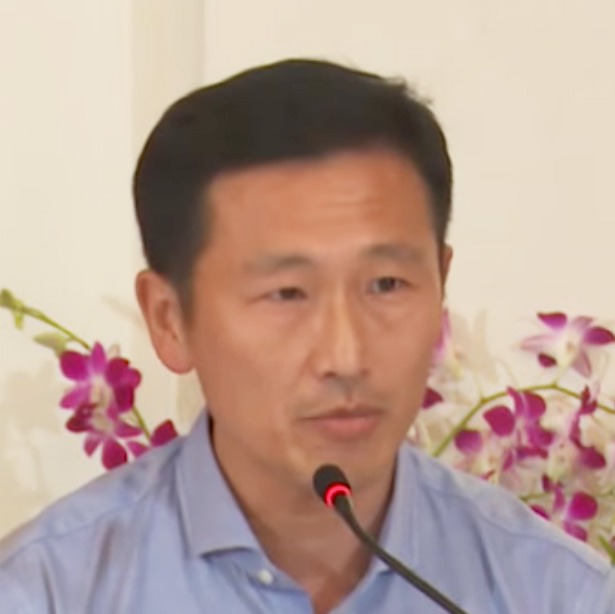
Acting Minister Ong Ye Kung: Good afternoon friends. First, I’d like to say it has been a great honour to be given this role which I think is complex and important for Singapore’s future. I think Minister Heng Swee Keat and all our predecessors before him have built an exceptional system. An educational system that is renown in the world – very successful and I will do my best and strive to build upon it, and contribute to this area. What is my top priority now? I think it is to really know how the Ministry works, get to know the people, our partners, understand the entire system and all its complexities and learn very fast. In this aspect, I really look forward to taking guidance from the range of Coordinating Ministers and DPMs who will always be there to provide guidance and mentorship. Really looking forward to working with Ng Chee Meng and being part of the MOE family.

PM Lee: Any questions for either Mas or Swee Keat?
Reuters: Thank you Prime Minister. This question is slightly related to the Finance Ministry although more broadly related to the economy.

PM Lee: Sorry, identify yourself?
Reuters: My name is Rujun Shen and I am from Reuters News. Do you agree with the view that Singapore faces the risk of a technical recession and if so, do you think there will be some special measures the Government is taking to try to revive the economy. Would you be able to explain to us what might be some of these measures?

PM Lee: I think we are not doing a quarterly economic report right now, so I don’t want to go into the question whether we are in a technical recession or not. Maybe the strategy for where we are going with our economy and how we can keep it growing, although not as quickly as before – that is something which has preoccupied the Minister for Finance, and not just financial issues but really the economic aspects of it.
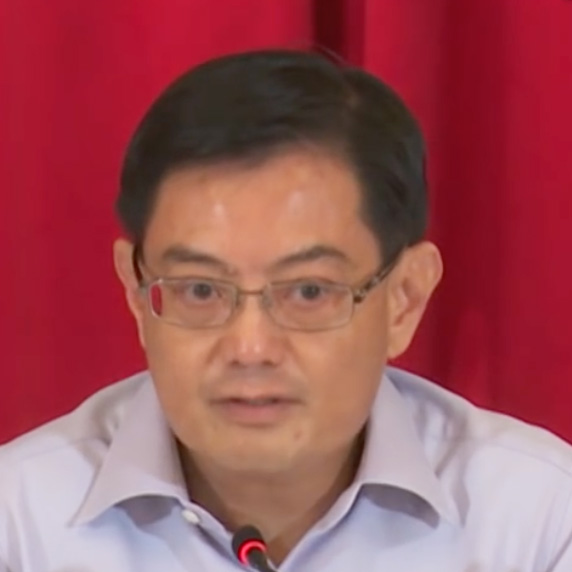
Minister Heng Swee Keat: Well, I think if you look at the global economy and financial conditions, it has been changing and continuing to change very rapidly. Internally, our economic structure is also evolving. So, there is much for us to take stock of and to do. But I think we are building on strong fundamentals. In our Economic Strategies Committee in the last round, which was chaired by DPM Tharman, it sets out the direction in building an economy that is innovation driven, that has high skills, high productivity and a lot of that restructuring effort has been taking place. It will take time to see some of these results, and we can take this occasion to take stock of it, and to see how the programmes we have put in place are working and how we can continue with some of the changes that we need to make.

PM Lee: Any questions for Masagos from Suria? OK, Berita in lieu of Suria.
BH: I just need Minister Masagos’ comment on his two new roles as Minister for the Environment and Water Resources, as well as his new job in assisting Minister Yaacob in Muslim Affairs matters.
Berita Mediacorp: I am Izwan Othman from Berita MediaCorp. Encik Masagos, soalan saya dalam Bahasa Melayu. Apakah siknifikannya pelantikan anda sebagai seorang Menteri yang akan membantu atau mungkin menyokong peranan yang akan dimainkan oleh Menteri Bertanggungjawab Bagi Hal Ehwal Islam, Yaacob Ibrahim?
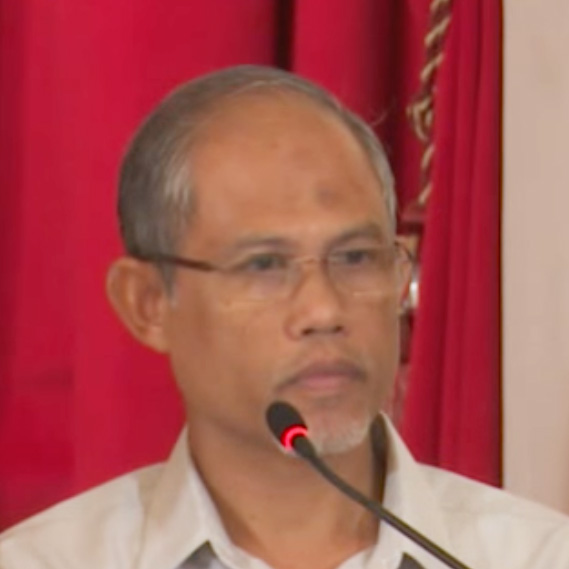
Minister Masagos Zulkifli: Mungkin saya menjawab soalan yang terakhir dahulu. Saya telah lama membantu pemerintah untuk mengatasi masalah fahaman ekstremis di kalangan masyarakat kita yang dipengaruhi oleh internet ataupun melalui ajaran-ajaran yang agak ekstrem. Jadi dalam hal ini saya sudah lama mendekati masyarakat Melayu/Islam. Cuma kali ini saya berpeluang melakukannya dalam bidang yang lebih luas, merangkumi juga hal-hal yang memberatkan kerukunan hidup kita sebagai orang Melayu, orang Islam, dalam masyarakat yang majmuk, dalam suasana yang juga lebih teratur kerana ada infrastruktur seperti Mendaki dan MUIS. Saya sangat gembira dapat menggunakan peluang ini untuk terus memajukan masyarakat Melayu/Islam dengan pimpinan Dr Yaacob dan juga Anggota Parlimen Melayu lain di Singapura.

PM Lee: Any questions for Grace? MCCY?

Q: Grace, you are the first female Minister to actually helm a full Ministry because you were previously at PMO. So just wondering what are your priorities? Especially MCCY is also relatively a new Ministry.
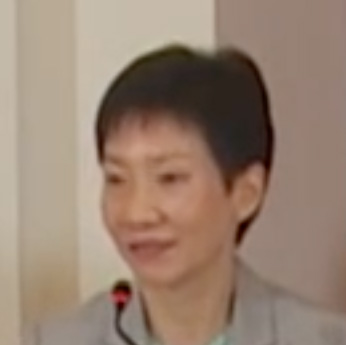
Minister Fu: Thank you very much. Good afternoon. I am very humbled by the confidence that PM has in me. I think MCCY, having its mission in building an engaged community, has started off in a very good phase of development under the leadership of my predecessor Minister Lawrence Wong. I think it is important for me to engage the stakeholders. So, I think this will be my priority – engage the stakeholders in the arts, sports, youth and voluntary communities so that we can build an even more engaged and committed community in Singapore.

PM Lee: OK, no more questions? One last one, I will take it, a short one. OK, the gentleman in front.
CNA: Thank you PM. Faris from Channel NewsAsia. My questions are for Mr Heng and Mr Ng. Mr Heng, you are a part of the group who actually changed the perception that you know, making Every School a Good School. Are people, especially parents, buying into that argument? Moving ahead, it is not so much the application of knowledge via SkillsFuture but starting from the fundamentals which is ensuring that parents have a more open approach towards education. Is that still a key challenge going ahead? That is one question for you.
Mr Ng, you have raised this point before prior to the elections – how people should change the view of meritocracy because people are still linking it to having a good life. How is that going to fit into what you are going to do because you are tackling the more fundamental aspects of education? Thank you.

Minister Heng: Let me answer that question. I think Every School a Good School is really a matter of deep conviction – that every child is a child of Singapore, and it is critical of us to provide the best possible education for every child. But at the same time, every child is different and that is how our schools must understand the profile of different students – their strengths, their interests, their learning needs. In doing so, they are able to then craft the right programmes to bring out their best. First of all, I would say that all along, we have been investing in our schools and it has been getting good results. Since we started using this term, many parents have come on board, especially in our primary schools. The way that parents are choosing primary school is much more informed now – they look at the programmes in our schools. In secondary schools, we still need more effort; in particular, in building up the very distinctive niches of the school and creating a variety of programmes such as our Applied Learning Programme, our Learning for Life Programme and the recently announced Community of Pathfinders in Action. We are bringing in people who are successful from different walks of life to help us with our schools, to inspire our students and help us design new pathways for them. I think that will make a major impact in the years ahead.

Acting Minister Ng: I think meritocracy remains a very important aspect of the education system and it need not be too narrowly defined. When I look at the history of the education system, we have already started to create multiple pathways to success. As what Minister Heng has said, there are different programmes to meet the educational aspects of our children. Whether you are academically inclined, sports inclined, or in the arts, there are already developing or developed pathways to this success.

Q: It seems this idea of meritocracy is still an issue going forward?

PM Lee: I think there will be time for that later on. Parliament is opening in January. We have a President’s Address and there will be a full debate. After that, we will have the Budget. I think Budget next year will be a bit later than usual, so we have time after the President’s Address to let the messages sink in, and time for the new Minister for Finance to decide on his priorities and present his first project. We will discuss this and many other issues later on.
Thank you very much.
* * * * *
Explore recent content
Explore related topics

